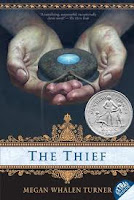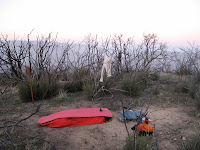Interspersed in my novel are sentences which have managed to hang on through five revisions and come out unscathed. There is one chapter that I love just the way I first wrote it: the dragons attacking, the aquatic monster raising curtains of water, and a young girl standing atop the monster’s watery shoulder, shouting suggestions in her ear. No part of the novel changed as much as my first line. After all, first lines are the first thing the reader sees in the book and must tantalize him or her into wanting to read more. Writers often attach great importance to their first words. In one sentence they try to hook the reader, give a hint to what comes next, present the world, the character, the action, and create a sense of mystery and suspense.
 My favorite beginning of a novel comes from Ayn Rand’s The Fountainhead: “Howard Roark laughed. He stood naked at the edge of a cliff. The lake lay far below him. A frozen explosion of granite burst in flight to the sky over motionless water.” Can you see him standing there? I can. I read those words and knew this story would be extraordinary, that Roark would be different from anyone else I’ve ever known. It helped, perhaps, that I read the book very young. I’m not sure what I would have thought of Roark’s rigid perspective of life as an adult. This beginning, however, influenced me, and I have always striven for a similar effect in my writing, an unbending and clear introduction of what my story is about.
My favorite beginning of a novel comes from Ayn Rand’s The Fountainhead: “Howard Roark laughed. He stood naked at the edge of a cliff. The lake lay far below him. A frozen explosion of granite burst in flight to the sky over motionless water.” Can you see him standing there? I can. I read those words and knew this story would be extraordinary, that Roark would be different from anyone else I’ve ever known. It helped, perhaps, that I read the book very young. I’m not sure what I would have thought of Roark’s rigid perspective of life as an adult. This beginning, however, influenced me, and I have always striven for a similar effect in my writing, an unbending and clear introduction of what my story is about.
 Of course, I have loved novels with less dramatic beginnings. The first two sentences of Jerome K. Jerome’s Three Men in a Boat always leave me feeling confused: “There were four of us — George, and William Samuel Harris, and myself, and Montmorency. We were sitting in my room, smoking, and talking about how bad we were — bad from a medical point of view, I mean, of course.” Somehow, these two bewildering sentences appeared endearing and characteristic after I got to know the narrator, but when I began the novel, I could not figure out why Jerome names six men when he says they were four but the book is titled three, or why he uses so many commas.
Of course, I have loved novels with less dramatic beginnings. The first two sentences of Jerome K. Jerome’s Three Men in a Boat always leave me feeling confused: “There were four of us — George, and William Samuel Harris, and myself, and Montmorency. We were sitting in my room, smoking, and talking about how bad we were — bad from a medical point of view, I mean, of course.” Somehow, these two bewildering sentences appeared endearing and characteristic after I got to know the narrator, but when I began the novel, I could not figure out why Jerome names six men when he says they were four but the book is titled three, or why he uses so many commas.
A great first line can be a treat, like the first bite of a truly delectable dish. “It is a truth universally acknowledged,” writes Jane Austen in Pride and Prejudice what is universally acknowledged as one of the very best first lines ever written, “that a single man in possession of a good fortune, must be in want of a wife.” My first line, not quite there, might still change and change again. I wouldn’t be so sure that it might not end up simply being: “Once upon a time in a faraway land there lived a princess who was not going to go on a birthday adventure.”
What is your favorite first line in a novel?




















